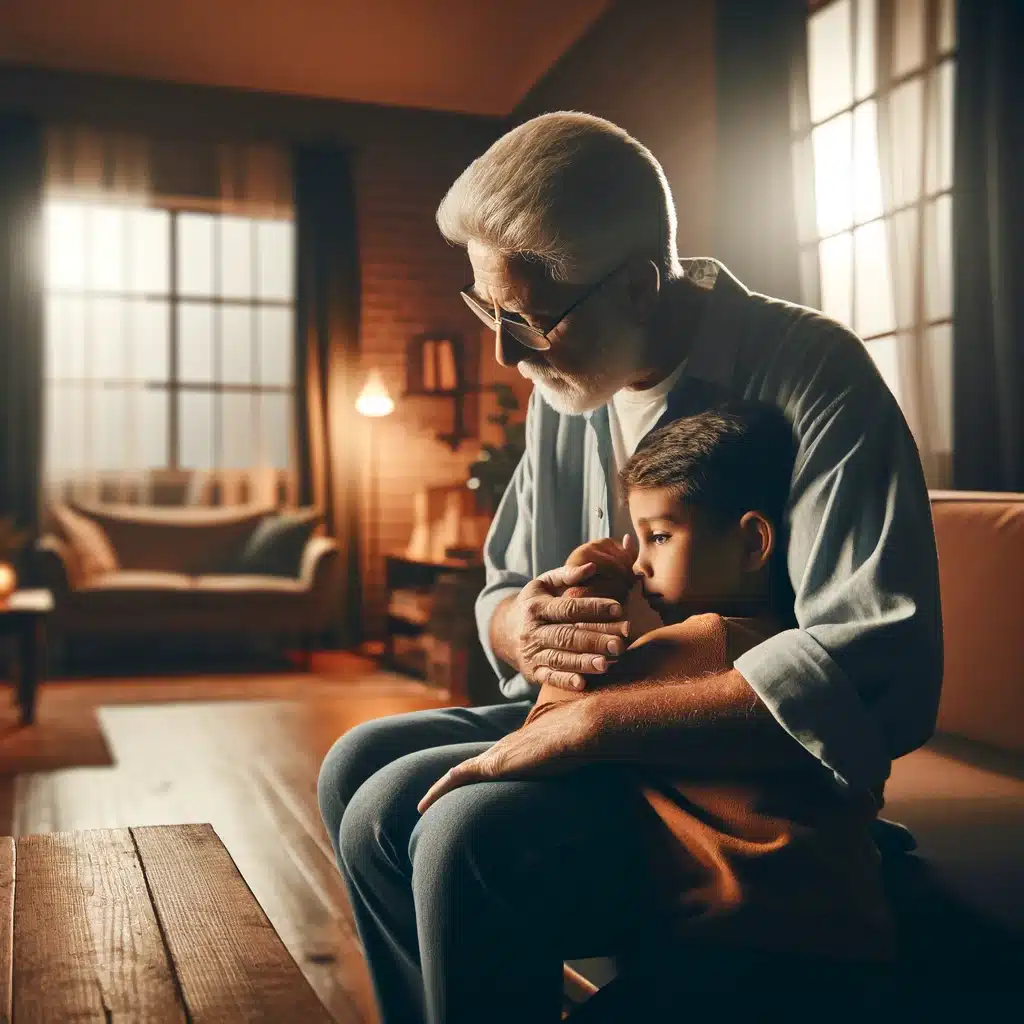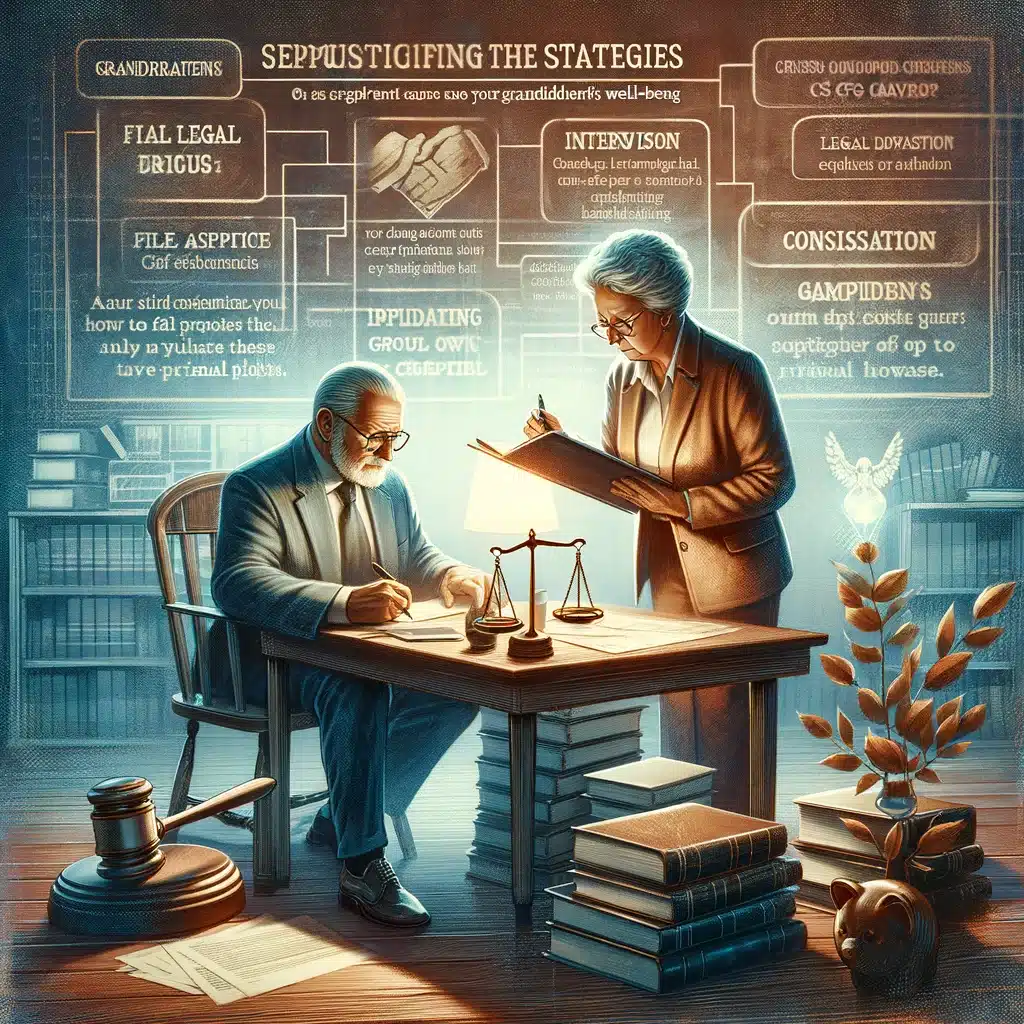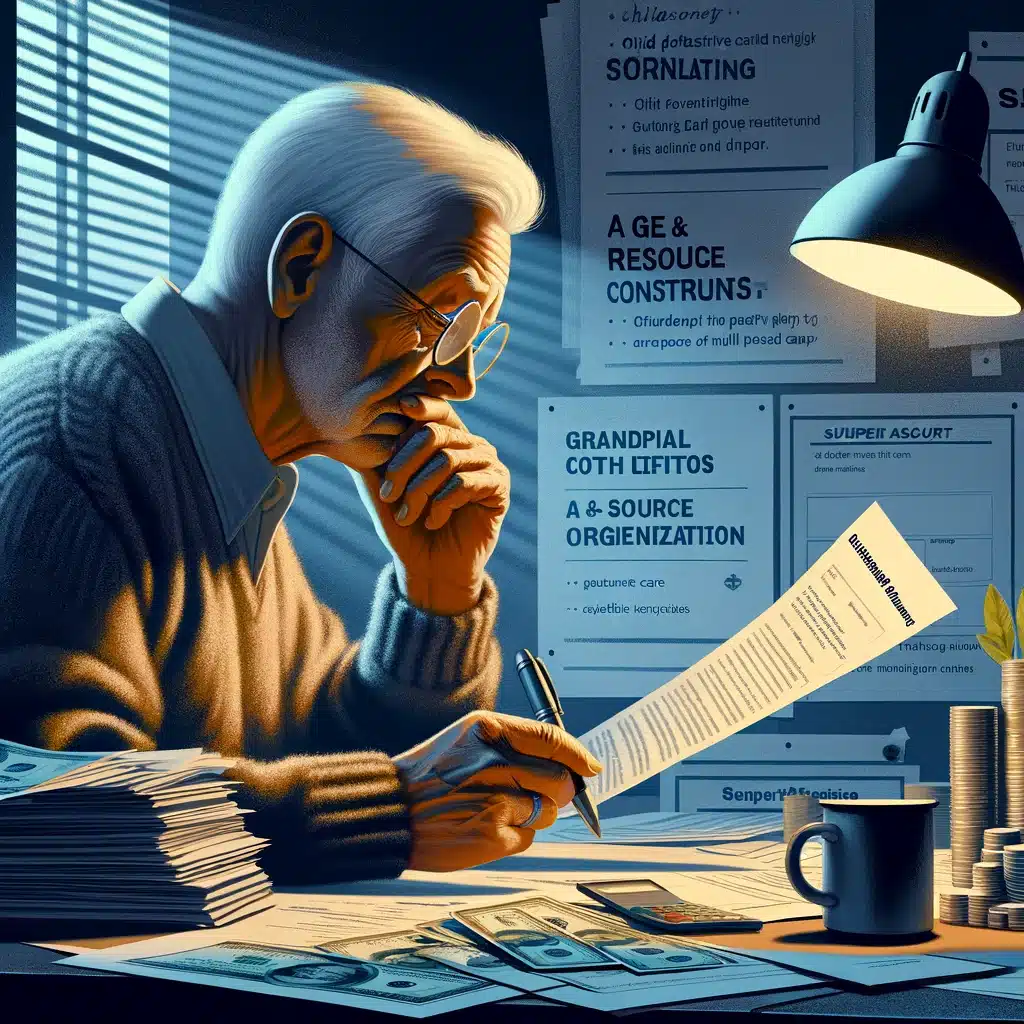Navigating the complex world of Child Protective Services (CPS) can be a daunting task, especially when it comes to reuniting with your beloved grandchild. In this blog post, we’re focusing on a critical issue many grandparents face: how to get your grandchild back from CPS. You’re not alone in this journey, and we’re here to provide comprehensive guidance on maneuvering through this challenging situation.
Short Answer: Reclaiming your grandchild from CPS is indeed possible. Our aim is to support you through the intricate and emotional process ahead.
Picture this scenario: You’re enjoying a peaceful morning with your coffee when suddenly, a phone call disrupts the calm. It’s your child on the other end, delivering the shocking news that CPS has taken your grandchild. Your mind races with panic and a multitude of questions. What led to this? What steps can you take to ensure their return?
Don’t despair, as we’re about to delve into the complexities of CPS cases, particularly in Texas. We’ll explore everything from your rights and responsibilities as a grandparent to the emotional turmoil accompanying these situations. This blog post isn’t just about providing information; it’s a beacon of hope for grandparents striving to reunite with their precious grandchildren.
We’ll offer insights, real-life stories, and actionable advice covering the legal procedures, support services, and alternatives to CPS involvement.
Prepare to embark on a journey of discovery, where we’ll unravel the mysteries of CPS processes and strive for a joyful reunion with your grandchild. The path may be fraught with challenges, but armed with the right knowledge and a strong resolve, we’re committed to helping you navigate towards a future filled with love and happiness.

How to Retrieve Your Grandchild from CPS: A Comprehensive Guide for Grandparents
Understanding the Complexities of CPS Cases in Texas
Child Protective Services (CPS) cases in Texas can be intricate and emotionally draining. These cases often involve sensitive issues such as child abuse or neglect. The consequences of these allegations can be severe, potentially leading to the removal of children from the home and termination of parental rights. It’s crucial to understand the gravity of these situations and the impact they have on the entire family.
The Role of Grandparents in Child Protective Services Cases
Grandparents can play a pivotal role in CPS cases. They’re not just bystanders; they can be directly involved and influential in the outcome. This is particularly relevant when the child’s immediate family environment is under scrutiny. Grandparents might offer a stable and loving home for the grandchild, making them key figures in these cases.
Navigating Legal Processes and Presenting Your Case
Dealing with CPS involves navigating complex legal processes. It’s important for grandparents to understand their rights and the procedures involved in these cases. Whether it’s presenting evidence, attending hearings, or collaborating with legal professionals, being prepared and informed is crucial. Grandparents need to be ready to present their case effectively to both CPS and the court if needed.
Supporting Your Grandchild through Emotional Challenges
Beyond the legal aspects, it’s vital to consider the emotional well-being of the grandchild. These cases can be traumatic, and grandparents can provide the necessary emotional support and stability during these challenging times. Being there for your grandchild, offering love, and ensuring they feel safe and cared for can make a significant difference in their emotional recovery.
Collaborating with Extended Family and Legal Professionals
In a CPS case, the involvement of extended family and professionals can be beneficial. Working together with other family members and seeking the assistance of legal experts can strengthen your position. It’s about creating a support network that works towards the best interest of the child.
A Call for Compassion and Resilience
CPS cases are undoubtedly challenging and can take a toll on all involved. However, with the right approach, information, and support, grandparents can navigate these situations effectively. It’s about staying informed, being prepared legally and emotionally, and maintaining a compassionate and resilient stance for the sake of your grandchild.
How to Get Your Grandchild from CPS: The Essential Role of Grandparents in Texas
The Crucial Role of Grandparents in CPS Cases

Grandparent Custody When a Parent is Addicted: Stepping In as Primary Caregivers
In situations where a child is removed from the care of parents struggling with addiction, grandparents often become the primary caregivers, even if it’s on a temporary basis. Under such circumstances, labeled as ‘Grandparent Custody When a Parent is Addicted‘, grandparents are usually the first in the family to be considered for this critical role. They provide the much-needed stability and consistency essential for the child’s wellbeing. For parents facing the prospect of temporary loss of custody due to addiction issues, it’s recommended to consider grandparents or other immediate family members as potential temporary caregivers.
The Financial and Emotional Challenges
Taking on the role of a caregiver for grandchildren often comes without any financial support, like child support, placing a significant burden on the grandparent. This situation can be challenging, as it involves balancing the needs of the grandchild with those of the grandparent’s immediate household. The ideal scenario is for the parent to reassume the role of primary caretaker as soon as possible to alleviate this burden.
Communicating Capability and Willingness to Caregive
If you’re a grandparent, it’s crucial to communicate to your children whether you’re capable of temporarily caring for your grandchildren. This communication is important because your child will need to provide CPS with a list of potential caretakers should your grandchild be removed from their home. By expressing your willingness and ability to fulfill this role, CPS will conduct a background and criminal history check, as well as a home inspection, to determine your suitability for temporary placement.
Navigating CPS Processes as a Grandparent
Understanding and navigating the CPS process is essential for grandparents willing to take on this role. Being informed and prepared for the legal and procedural aspects can make a significant difference in the outcome of the case.
Grandparents as Vital Supporters in CPS Cases
Grandparents hold a unique and influential position in CPS cases in Texas. Their role in providing a safe and loving environment for grandchildren during these challenging times cannot be overstated. By understanding their role and preparing for the responsibilities, grandparents can make a significant impact on the well-being and future of their grandchildren.
How to Get Your Grandchild from CPS: Understanding Child Removal Reasons and Grandparent Intervention
Common Reasons for Child Removal by CPS
One of the most frequent reasons for the removal of a child from their home by Child Protective Services (CPS) is parental alcohol or drug addiction. This issue is complex and sensitive, often placing grandparents in a difficult position regarding their involvement and influence.

The Delicate Balance for Grandparents
As a grandparent, you might feel torn between the fear of losing access to your grandchild and the need to protect them from potential harm due to their parent’s addiction issues. This balancing act is challenging, as speaking out about your child’s substance abuse could risk alienating them, but remaining silent might endanger your grandchild.
Grandparents as the Last Line of Defense
In many cases, grandparents are the last line of defense for their grandchildren. If you, as a grandparent, sense that your grandchild is in danger, it’s crucial to act decisively. This might involve directly intervening or contacting CPS if you believe it’s in the best interest of the child’s safety.
Addressing Concerns with Your Child
One approach is to have an open and supportive conversation with your child about their behavior. Offering support and suggesting services could be a more effective and compassionate way to address the issue, rather than immediately resorting to external intervention.
Reporting Abuse or Neglect to CPS
If there are signs of abuse or neglect, a report to CPS may become necessary. CPS will then investigate to determine if there is sufficient evidence of abuse or neglect. In severe cases, this may lead to the removal of your grandchild from the home to allow the parent to seek counseling, therapy, or to rectify any hazardous situations in the home.
Navigating the CPS Process as a Grandparent
Understanding and navigating the CPS process is vital for grandparents in these situations. Being informed about your rights and the procedures can significantly impact your ability to support and, if necessary, temporarily care for your grandchild.
The Crucial Role of Grandparents in Child Welfare
In situations where a child’s well-being is at risk due to parental addiction, grandparents can play a crucial role. By balancing concern for the parent with the safety of the grandchild, grandparents can help ensure the child’s welfare and, when necessary, take steps on how to get your grandchild from CPS.
How to Get Your Grandchild from CPS: The Role of Grandparents as Primary Caregivers
Recognizing the Role of Grandparents in Daily Care
In many situations, grandparents find themselves acting as the de-facto primary caregivers for their grandchildren. This often occurs when the parent is unable to provide day-to-day care. If you, as a grandparent, have a dedicated bedroom for your grandchild, regularly look after them after school, and handle most of their daily caregiving needs, you’re already playing a crucial role in their life. This positions you well to be considered as a potential caregiver in a Child Protective Services (CPS) case.

Preparing to Become the Primary Caregiver in CPS Cases
When a grandchild is removed from their home, you as a grandparent may be asked to step in as the primary caregiver for a certain period. This transition can be complex, particularly because CPS may still be involved in providing services for the child. It’s essential to have a basic understanding of how CPS cases work before taking on this role.
Navigating Legal Considerations with Professional Advice
Given the complexities involved in CPS cases, it’s advisable to consult with an experienced family law attorney. This consultation can help you understand the scope of what you can and cannot do as a temporary caretaker during a CPS case. Legal guidance is crucial to ensure that you’re fully prepared for the responsibilities and legal implications of caring for your grandchild during this time.
Grandparents as Vital Support in Child Welfare Cases
If you’re already involved in the daily care of your grandchild and face the possibility of them being removed from their home, you play a vital role in their well-being. Understanding how to get your grandchild from CPS and preparing yourself for potential legal and caregiving challenges is crucial. With the right knowledge and support, grandparents can provide a safe and loving environment for their grandchildren during these challenging times.
How to Get Your Grandchild from CPS: Key Considerations for Grandparents in Texas
Assessing Financial Readiness for Grandparent Caregivers
One crucial aspect for grandparents to consider before getting involved in a CPS case is their financial situation. While it may seem secondary to the well-being of your child and grandchild, your income is a vital factor in your success as a temporary caretaker. This is especially important for grandparents who are retired or on a fixed income, such as Social Security or a pension. The financial strain can become significant when taking in one or more grandchildren, as the fixed income might not stretch to cover the additional expenses. Support from the state or the child’s parents may not always be available, so conducting a thorough financial assessment is essential in determining your capability to provide for your grandchild during a CPS case.

Evaluating Physical Capability for Caregiving
Another important consideration is the physical ability of the grandparents to care for their grandchildren. This involves an honest assessment of any health issues or physical impairments that might affect your ability to perform day-to-day caretaking responsibilities. Both grandparents should evaluate their health and physical capabilities realistically. If you find that full-time caregiving might be too challenging, there are still other ways to support and care for your grandchildren, considering your limitations.
Preparing to Become a Caregiver in a CPS Case
For grandparents looking into how to get your grandchild from CPS, it is critical to evaluate both your financial and physical readiness to take on this role. By making an honest assessment of these factors, you can better prepare for the responsibilities and challenges of being a temporary caregiver, ensuring the best possible outcome for your grandchild.
How to Get Your Grandchild from CPS: Addressing Grandparents’ Concerns and Rights
Evaluating Your Ability to Meet Your Grandchild’s Needs
As grandparents begin to engage in a Child Protective Services (CPS) case, it’s important to realistically assess whether you can meet the specific needs of your grandchild. If your grandchild has physical or mental impairments, it may push your caregiving abilities to their limits. While your intentions to care for your grandchild might be heartfelt, it’s crucial to acknowledge your limitations. Overcommitting beyond your capabilities could lead to an unsustainable situation for both you and your grandchild.

Grandparent Visitation in Texas: What You Need to Know About Gaining Access to Grandchildren
In Texas, grandparents should be aware of the nuances and limitations regarding their rights in seeking to become primary conservators of their grandchildren, especially after a Child Protective Services (CPS) case. The law in Texas does not automatically entitle grandparents to intervene if the child’s parents decide to limit their access to the grandchildren. To establish custody or visitation rights, grandparents may find it necessary to initiate a legal suit affecting the parent-child relationship or to intervene in an ongoing case. Texas law gives significant weight to parental rights in making decisions about their children’s interactions, including contact with grandparents. Understanding the nature of your relationship with your grandchild’s parents is crucial before taking steps towards gaining visitation rights or custody, a key aspect of grandparent visitation in Texas.
Assessing the Legal Rights of Grandparents During a Texas Divorce: Balancing Needs and Well-being of Grandchildren
For grandparents considering how to retrieve their grandchild from CPS in the context of a Texas divorce, understanding and assessing your legal rights and limitations is crucial. This process requires a careful balance between the needs and well-being of your grandchild and your own capabilities, all within the confines of the legal framework governing grandparent rights in Texas. Navigating these complexities effectively is key to determining your role and the potential for involvement in your grandchild’s life during and after the divorce proceedings.
Preparing for a CPS Case as a Grandparent
In preparing for a CPS case, grandparents must consider their abilities to meet their grandchild’s needs and understand the legal landscape regarding their rights. By being informed and realistic, grandparents can better navigate the complexities of CPS cases and advocate effectively for the welfare of their grandchildren.
How to Get Your Grandchild from CPS: Strategies for Grandparents Ensuring Grandchildren’s Well-being
Navigating Legal Rights as a Grandparent in CPS Cases
Although grandparents have limited rights in becoming primary caretakers post-CPS case, there are ways to position yourself for this role. You can either file your own suit affecting the parent-child relationship or intervene in a case already filed by Child Protective Services (CPS). Your case is strengthened if you’ve been the primary caretaker for at least six months prior to the CPS case.

Considering Filing for Permanent Custody Through Intervention
Intervention in a previously filed CPS case offers another avenue for grandparents. This involves seeking permanent custody of your grandchild, beyond just being a temporary caretaker during the CPS proceedings. When considering this step, there are important factors to keep in mind.
Understanding the Implications of Parental Rights Termination in CPS Cases
A critical aspect of CPS cases is the potential termination of the parent’s rights. Until these rights are terminated, the parent retains authority over custody, visitation, and other decisions regarding the child. If you believe that your child is unfit to parent and your grandchild is at risk of serious harm, the first step in the intervention is demonstrating this risk. This process is crucial for grandparents looking into how to get your grandchild from CPS, especially in cases where the child’s safety and well-being are at stake.
Grandparents’ Role in Protecting Grandchildren
For grandparents committed to ensuring the well-being of their grandchildren in CPS cases, understanding and navigating the legal system is essential. By exploring options like filing a suit or intervening in existing CPS cases, grandparents can take active steps to seek the best outcome for their grandchildren. Being informed and prepared for these legal challenges is key to effectively advocating for the safety and welfare of your grandchild.
How to Get Your Grandchild from CPS: Navigating Post-Termination of Parental Rights
Working with CPS for Grandchild Placement
Once a CPS case results in the termination of your child’s parental rights, the next step for grandparents is to collaborate with CPS to secure the placement of your grandchild in your home. Demonstrating that this placement is in the best interest of the grandchild is crucial. Grandparents who have consistently been a reliable source of care for their grandchildren are often favorably positioned in these situations.

Overcoming Potential Challenges in CPS Cases
Occasionally, a CPS caseworker might raise concerns about naming you as the primary conservator due to factors like age, limited resources, or other minor issues. These challenges underline the importance of having professional legal representation.
The Importance of Legal Representation
In such scenarios, it’s advisable for grandparents to hire an experienced family law attorney. An attorney can effectively advocate for your rights during any intervention in your grandchild’s CPS case. Having expert legal advice and support can be invaluable in navigating the complexities of the CPS system and ensuring the best outcome for your grandchild.
Advocating for Your Grandchild’s Best Interest
For grandparents figuring out how to get your grandchild from CPS, engaging with the process after the termination of parental rights and seeking professional legal assistance are key steps. With the right approach and support, grandparents can play a crucial role in providing a safe and loving environment for their grandchild.
How to Get Your Grandchild from CPS: A Guide for Grandparents
Understanding the Legal Process in CPS Cases
Navigating a Child Protective Services (CPS) case in Texas can be complex, particularly when you’re striving to reunite with your grandchild. It’s essential to understand the legal process, which includes multiple stages like hearings, presenting evidence, and legal representation. The first and most crucial step for any grandparent is to consult with an experienced family law attorney who has expertise in CPS cases. They will provide valuable guidance on your rights and responsibilities and help you navigate the legal system.

Recognizing Grandparents’ Rights and Responsibilities
In CPS cases, grandparents often face a challenging path due to their limited rights compared to biological parents. However, understanding your potential role and legal standing is key to making a significant impact in your grandchild’s life. Grandparents can offer essential emotional support and a stable environment for their grandchildren. Familiarizing yourself with your rights and responsibilities is critical for achieving a positive outcome for your grandchild.
Navigating CPS Cases as a Grandparent
For grandparents looking into how to get your grandchild from CPS, it’s important to be well-informed and legally prepared. Understanding the intricacies of CPS cases and your role in them can empower you to effectively advocate for the well-being and reunification with your grandchild.
How to Get Your Grandchild from CPS: Managing Emotional Impact and Seeking Support
Addressing the Emotional and Psychological Impact
The emotional strain of a Child Protective Services (CPS) case can be significant for both grandparents and grandchildren. These cases are often fraught with emotional challenges, making it crucial to address the psychological effects on all parties involved. Seeking support from therapists or counselors who specialize in family dynamics during CPS cases is vital. Ensuring the emotional health of both you and your grandchild is paramount during these times.

Exploring Support Services
During a CPS case, various types of support can be crucial. This includes financial assistance, counseling, and educational resources. Delving into the available services and resources is essential for managing the situation effectively. These supports can prove invaluable in ensuring the well-being and stability of your grandchild during the challenging period of a CPS case.
Considering Alternatives to CPS Intervention
Sometimes, direct CPS intervention may not be the most suitable initial approach for concerns regarding a grandchild’s safety. Alternatives like mediation or counseling can be effective, fostering open communication and cooperation between grandparents and parents. It’s important to explore these options thoroughly to determine the best course of action for your specific circumstances, particularly when considering how to get your grandchild from CPS.
Navigating the Journey with Care and Support
For grandparents involved in CPS cases and looking at how to get your grandchild from CPS, it is critical to manage the emotional aspects and seek comprehensive support. By understanding and utilizing available resources, and considering all possible approaches, grandparents can navigate these challenging times with greater resilience and effectiveness.
How to Get Your Grandchild from CPS: Understanding Parental Rights Termination and Legal Representation
Navigating Parental Rights Termination in CPS Cases
The termination of parental rights is a pivotal aspect of Child Protective Services (CPS) cases. Understanding this legal process and its consequences is essential for grandparents. During this process, the primary focus should be on the safety and well-being of your grandchild. It’s important to collaborate closely with your attorney to ensure that you are prepared to provide a secure and stable environment for your grandchild if the parental rights are terminated.

The Critical Role of Attorneys in CPS Cases
Engaging an experienced family law attorney is not merely a recommendation, but an essential step when involved in a CPS case. An attorney will act as your advocate, offering legal guidance and navigating you through the complexities of the case. The expertise of your attorney is crucial in influencing the outcome, particularly when figuring out how to get your grandchild from CPS.
Estate Planning for High Net-Worth Individuals: Addressing Child’s Best Interest in CPS Cases
In the realm of estate planning for high net-worth individuals, addressing the needs of children in CPS cases becomes crucial, especially when determining the child’s best interest. Understanding the court’s assessment process and the various factors it considers is essential. Having a skilled attorney can be instrumental in these scenarios, as they help in presenting a compelling case. For high net-worth individuals, the attorney’s role extends to clearly demonstrating how the child’s best interests are served, particularly when the care and guardianship of a grandchild are involved. This ensures that the estate planning process encompasses all aspects of the child’s welfare and future security.
Prioritizing Grandchild’s Welfare in CPS Proceedings
For grandparents seeking how to get your grandchild from CPS, comprehending the significance of parental rights termination and the indispensable role of legal representation cannot be overstated. By focusing on the child’s best interest and working closely with a skilled attorney, grandparents can effectively navigate the CPS process to advocate for the welfare and security of their grandchild.
How to Get Your Grandchild from CPS: Addressing Age and Resource Challenges, and Emphasizing Conflict Resolution
Assessing Age and Resource Constraints in Providing Care
When looking into how to get your grandchild from CPS, it’s important to consider the impact of age and available resources on your ability to provide adequate care. Conducting an honest evaluation of your physical capabilities and financial resources is crucial in determining your readiness to take on this responsibility. If there are gaps in what you can provide, explore support organizations that might offer assistance, ensuring you can meet the needs of your grandchild during a CPS case.

Prioritizing Effective Communication and Conflict Resolution
In navigating CPS cases, effective communication and conflict resolution are key. Aim for open and respectful dialogue with the child’s parents and other family members involved. This approach fosters a collaborative environment focused on the child’s best interests. If disagreements arise, consider seeking mediation services. Mediation can help in finding common ground, ensuring that the welfare of your grandchild remains the central focus of all discussions and decisions.
Preparing for Grandchild Custody with Comprehensive Strategies
For grandparents investigating how to get your grandchild from CPS, preparing to become a caregiver involves more than legal readiness. It also includes assessing personal capabilities, securing necessary resources, and developing effective communication and conflict resolution skills. By addressing these areas, grandparents can better navigate the complexities of CPS cases and advocate for the safety and well-being of their grandchildren.
Conclusion:
As we reach the final pages of our guide, picture this: Your grandchild’s laughter fills the room, and the warmth of their embrace melts away the worries that once clouded your days. It’s a scene every grandparent longs for, and we’re here to help you turn it into reality.
Remember, every great story has its challenges and twists. CPS cases can feel like a maze, but with the courage of a lion and the wisdom of an owl, you can find your way through. We’ve explored the legal avenues, the emotional rollercoaster, and the support networks available to you.
Why should you keep reading? Because your grandchild’s smile is worth every effort. Because love knows no bounds, and grandparents’ hearts are vast enough to bridge any gap. Because, in the end, the bond between a grandparent and their grandchild is a treasure beyond measure.
So, dear reader, as you close this chapter, know that you are not alone on this journey. Reach out to the experts, lean on your support system, and believe in the power of love. Your grandchild awaits, and together, you’ll create a story filled with love, resilience, and the sweetest reunions.
FAQs on Grandparents’ Rights and CPS Cases
What are grandparents rights in Texas CPS?
In Texas, grandparents have limited rights in CPS cases. They can request custody or visitation, but this is typically granted only if it’s in the best interest of the child and does not interfere with the parental rights.
Can grandparents get custody from CPS in California?
In California, grandparents can request custody through CPS if the parents are deemed unfit. The court will consider the best interest of the child while making a decision.
How do I look up a CPS case in Texas?
To look up a CPS case in Texas, you may need to contact the local CPS office or use online resources provided by the Texas Department of Family and Protective Services, if available. Note that confidentiality laws may restrict access to certain details.
How do I intervene in a CPS case in Texas?
To intervene in a CPS case in Texas, you may need to file a motion in the court handling the case. It’s advisable to consult with a lawyer to understand the specific legal requirements and process.
What CPS Cannot do in Texas?
In Texas, CPS cannot remove a child from their home without a court order unless there is an immediate risk of harm. CPS also cannot force you to take certain actions without a court order.
What states have grandparents rights?
Most states in the U.S. have some form of grandparents’ rights, but these rights vary widely from state to state. Typically, these rights allow for visitation and, in some cases, custody, especially if the parents are unable or unfit to care for the child.
At what age do grandchildren lose interest in grandparents?
There is no specific age when grandchildren lose interest in grandparents. The nature of the relationship can change as grandchildren grow and develop, but many maintain strong bonds with their grandparents throughout life.
What are the visitation rights courts have awarded grandparents?
Courts may award visitation rights to grandparents if it is in the best interest of the child, especially if there is an existing relationship between the grandchild and the grandparent. The specifics vary based on state law and the particulars of each case.
Bryan Fagan, a native of Atascocita, Texas, is a dedicated family law attorney inspired by John Grisham’s “The Pelican Brief.” He is the first lawyer in his family, which includes two adopted brothers. Bryan’s commitment to family is personal and professional; he cared for his grandmother with Alzheimer’s while completing his degree and attended the South Texas College of Law at night.
Married with three children, Bryan’s personal experiences enrich his understanding of family dynamics, which is central to his legal practice. He specializes in family law, offering innovative and efficient legal services. A certified member of the College of the State Bar of Texas, Bryan is part of an elite group of legal professionals committed to ongoing education and high-level expertise.
His legal practice covers divorce, custody disputes, property disputes, adoption, paternity, and mediation. Bryan is also experienced in drafting marital property agreements. He leads a team dedicated to complex family law cases and protecting families from false CPS allegations.
Based in Houston, Bryan is active in the Houston Family Law Sector of the Houston Bar Association and various family law groups in Texas. His deep understanding of family values and his professional dedication make him a compassionate advocate for families navigating Texas family law.




